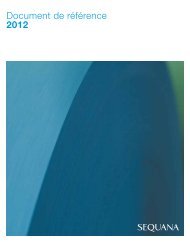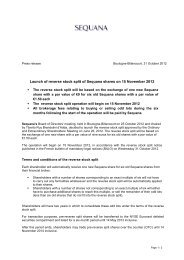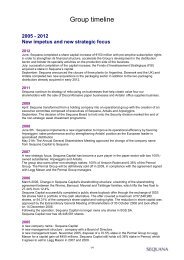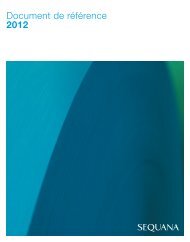Contents
Registration document PDF - Sequana
Registration document PDF - Sequana
You also want an ePaper? Increase the reach of your titles
YUMPU automatically turns print PDFs into web optimized ePapers that Google loves.
Corporate governanceBoard of Directors 2Directors may participate in Board meetings via video conferenceor telecommunication and are deemed to be present for purposes ofquorum and majority requirements, except when this is disallowedby French law for certain items on the agenda of the meeting.Assessment of the Board’s performanceUnder the Board of Directors’ internal rules, the Board meets oncea year to assess its operation and independence. At each annualmeeting, it also assesses the performance of corporate officers.The Board may also commission (at least once every three years)an assessment of its own performance by an external consultantor by the Board secretary. The Board made use of this facility,and at its meeting of 8 March 2012, commissioned an assessmentfrom the Board secretary. The results of this assessment were disclosedto the Board on 27 April 2012.Based on directors’ responses to the questionnaire sent out, the proceduresin place and the quality of work performed by the Boardwere felt to be satisfactory. The issues covered in the study includethe frequency of and care taken to prepare meetings, the quality ofthe Board’s discussions, the independence of the views expressed,the access of directors to the information needed for their deliberationsalong with the contents thereof, and the minutes drafted.Without calling into question the quality and quantity of informationprovided to the Board of Directors, the survey highlightedthat improvements are expected, especially in light of the currenttense market environment (lower volumes and pressure on rawmaterials prices), so that it has more comprehensive informationconcerning the Group’s industrial and commercial activities inparticular, and that it be called upon more frequently to debate thestrategy implemented by the Company. Certain directors considerthat the role and composition of the Strategy Committee could bestrengthened in this respect. The composition of the Board couldbe strengthened by the presence of a director – preferably independent– with expertise in the Group’s activities (distribution,paper sector or another capital intensive industry).Lastly, among the subjects that the Board and its specialisedcommittees could deal with to improve the quality of their workand play their role in full, the survey suggests that special attentionbe paid to two points: the succession plans for the Chairmanand Chief Executive and risk prevention and management.Missions entrusted to the Board committeesNominations and Compensation CommitteeIn accordance with the committee regulations adopted by theBoard of Directors on 3 May 2005, the role of the Nominationsand Compensation Committee is to review all matters relating tothe composition, organisation and modus operandi of the Board ofDirectors and its committees and to submit to the Board’s recommendationson compensation to be paid to executive managersand corporate officers, including the Chairman and the ChiefExecutive Officer. The committee reviews stock option plans andany proposals for share awards submitted by management.Audit CommitteeIn accordance with the committee regulations adopted by theBoard of Directors on 3 May 2005 and subsequently amendedon 27 July 2010, the Audit Committee focuses on three mainareas: (i) the financial reporting process, (ii) the effectiveness ofrisk management and internal control procedures, and (iii) theindependence of Statutory Auditors and the performance of thestatutory audit engagement.The committee monitors issues regarding the preparation andvalidation of accounting and financial data, ensures that theaccounting policies used to prepare the consolidated and parentcompany financial statements are appropriate and applied consistently,and that major transactions are accounted for appropriatelyat the level of the Group. It also verifies that internal data compilationand validation procedures are designed with this purposein mind. The committee analyses (a) the scope of the consolidatedGroup and, where appropriate, the reasons why certain entitiesare not consolidated, (b) the accounting standards applicable tothe Group and their implementation, (c) the annual and interimconsolidated and parent company financial statements along withany financial and accounting issues brought to its attention byexecutive management, particularly as regards the Group’s cashposition, financing and compliance with bank covenants, and (d)the risks to which the Group may be exposed and any materialoff-balance sheet commitments.The committee is kept up to date on the organisation and operationof risk management procedures by executive management,and ensures that these procedures are effective. It also overseeshow risks are flagged up, monitored or covered by appropriateinsurance policies. The committee issues recommendations onthe organisation of the Group’s internal audit department and isinformed of the internal audit agenda. It also receives regular summariesof internal audit reports. The committee also familiarisesitself with the internal audit action plan, is informed at least oncea year of the progress of this plan, and monitors the procedures putin place by the Company to ensure the actions taken are effectiveand comply with regulations and a recognised framework.The Audit Committee is provided with the report of theChairman of the Board of Directors on internal control and riskmanagement procedures and issues an opinion before the reportis approved by the Board.The committee is responsible for the Statutory Auditor selectionprocedure and makes recommendations to the Board onthe appointment or renewal of Statutory Auditors. The committeeensures that the Statutory Auditors meet the requisite independencecriteria and makes recommendations on fees payable toStatutory Auditors in respect of their statutory audit engagement.It also issues recommendations on advisory engagements andother related audit services that may be provided by the StatutoryAuditors or by members of their network outside the statutoryaudit engagement, and ensures that such engagements complywith legal regulations. Every year, the committee is briefed by theStatutory Auditors on the amount and breakdown of fees per categoryof audit and advisory engagement and other services paidby the Group to the Statutory Auditors or members of their networkin the past year. It also examines the auditors’ work scheduleand the findings of the audit. On closing the interim and annualfinancial statements, the committee receives a report from theStatutory Auditors setting out the key issues resulting from theirwork and the accounting options applied.Sequana | 2012 Document de référence (English version) | 61









